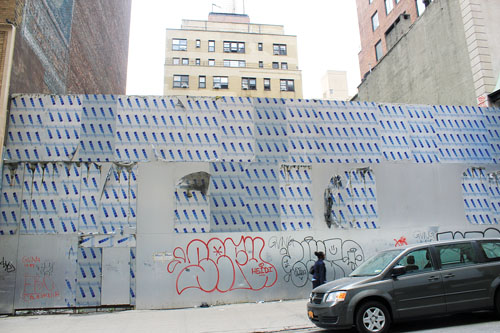- California Assembly OKs highest minimum wage in nation
- S. Korea unveils first graphic cigarette warnings
- US joins with South Korea, Japan in bid to deter North Korea
- LPGA golfer Chun In-gee finally back in action
- S. Korea won’t be top seed in final World Cup qualification round
- US men’s soccer misses 2nd straight Olympics
- US back on track in qualifying with 4-0 win over Guatemala
- High-intensity workout injuries spawn cottage industry
- CDC expands range of Zika mosquitoes into parts of Northeast
- Who knew? ‘The Walking Dead’ is helping families connect
In New York and Chicago, two Korea Centers on the wait

The construction site of the New York Korea Center on 32nd St. in Manhattan started in 2012 and was slated to be completed August 2014.
By Tae Hong
While Chicago Korean Americans prepare to dive into discussion for an imagined Korea Center in the city, a planned facility with the same name in Manhattan is growing weeds as it remains on hold past its expected completion date.
On Wednesday, the board of directors of the Korean American Association of Chicago held a meeting to approve tentative plans to fundraise for a $5 million Korea Center.
A committee to move the construction of the building forward will be created, and we believe the community’s support of the center will increase as they understand the good intentions behind the facility, said Seo Jung-il, association president.
The association plans to hold a concert featuring Korean pop singer Byun Jin-seop at Skokie Performing Arts Center on Jan. 17 next year in an early attempt to raise money for the project.
Meanwhile, the New York Korea Center — construction of which started in Dec. 2012 and which was slated for completion in August this year — sits neglected as it struggles to find builders.
Located between Lexington Ave. and Park Ave. on a former parking lot, the center was introduced as a cultural hub of rising Hallyu boasting exhibition space, stages for performances and lectures and a library.
Plans for the eight-story, 33,000 square foot facility were put on indefinite hold in February after a series of five construction bids, companies wary of the center’s low profitability and complicated architecture, according to Korean Cultural Service New York.
The South Korean Ministry of Culture, Sports and Tourism and the Ministry of Strategy and Finance proposed a budget provision to add about $28 million to the project in May, but no solutions have come through as of November.
“The National Assembly provided funds because they said it needed to be built, so what is the reason for the years-long postponement?” said Jung Byung-gook, a Korean assemblyman with the Saenuri party during a meeting at the New York Consulate General of Korea in October.
Jung encouraged New York Koreans to push efforts to get the project moving off the ground instead of waiting for a solution from Korea.












![일본 사도광산 [서경덕 교수 제공. 재판매 및 DB 금지]](http://www.koreatimesus.com/wp-content/uploads/2024/07/PYH2024072610800050400_P4-copy-120x134.jpg)



Pingback: NY Korea Center budget sees increase – The Korea Times